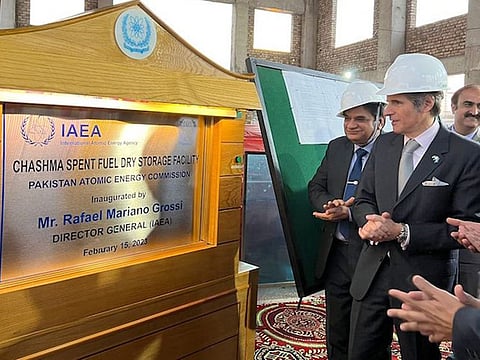IAEA, Pakistan to enhance cooperation in nuclear technology uses in health and climate
Grossi 'impressed by high standard of Pakistan Centre of Excellence in Nuclear Security'

Islamabad: Rafael Grossi, the chief international nuclear agency, visited Pakistan where he discussed expanding cooperation in peaceful applications of nuclear science and technology in health, cancer treatment, improving agriculture, and combating the climate crisis.
Grossi, director general of the International Atomic Energy Agency (IAEA), met with several officials and visited nuclear facilities, cancer treatment centres and agricultural research institutions utilising nuclear technology for sustainable development.
The IAEA chief toured the Pakistan Atomic Energy Commission (PAEC), Pakistan Nuclear Regulatory Authority (PNRA), and Pakistan Institute of Nuclear Science and Technology (PINSTECH), to discuss the country’s peaceful nuclear programme, improving healthcare, agriculture, food, water, and electricity. Grossi said that he was “impressed by the high standard of the Pakistan Centre of Excellence in Nuclear Security” and looked forward to improving cooperation. “Nuclear security is a crucial element within the continued cooperation between Pakistan and IAEA,” he said.
New facilities inaugurated
During his two-day (February 15-16) visit, Grossi inaugurated several facilities including Pakistan’s National Radiation Emergency Coordination Centre in Islamabad, a cyberknife centre (a fully robotic radiotherapy device) for cancer treatment at Pakistan Nuclear Medicine Oncology and Radiotherapy Institute (NORI) and a spent fuel dry storage facility at Chashma Nuclear Power Plant which accounts for almost a quarter of Pakistan’s low-carbon electricity.
“Nuclear energy and applications improve the lives of Pakistan’s people,” Grossi said in a tweet sharing photos of his visits and meetings. He said that he had “a meaningful exchange on the comprehensive and cohesive nature of the country’s peaceful nuclear programme” with PAEC chairman Raja Ali Raza Anwar. He also met PNRA chairman Faizan Mansoor. In Faisalabad, he designated the Nuclear Institute for Agriculture & Biology (NIAB) as an IAEA collaborating centre in agriculture and biotechnology.
'Positive development'
Nuclear security experts have termed the visit a “positive development” for Pakistan. “The visit speaks to Pakistan’s impressive credentials in the peaceful application of nuclear technology, as well as IAEA’s ongoing cooperation with the country,” Dr. Rabia Akhtar, director at Centre for Security, Strategy and Policy Research (CSSPR), University of Lahore, told Gulf News.
Pakistan should use this visit as an opportunity “to explore avenues for strengthening partnerships in using nuclear technology in the agriculture and power sectors” in which the country is currently facing pressing challenges, she suggested. The visit will be a good follow-up to streamline cooperation as envisaged in the Practical Arrangements signed by the IAEA and PAEC in 2021, she added.
Nuclear cooperation discussed
The IAEA chief held separate meetings with the prime minister and foreign minister of Pakistan to discuss areas of cooperation in the fields of health, agriculture, industry, nuclear medicine, and power generation. Prime Minister Shehbaz Sharif expressed Pakistan’s interest in expanding its collaboration with the IAEA, both as a recipient and provider of expertise and technical assistance. He briefed the IAEA chief about the crucial role of nuclear technology in 19 cancer hospitals in Pakistan.
He praised the IAEA’s “Rays of Hope” programme in Pakistan to expand radiotherapy and acknowledged the ongoing cooperation between the IAEA and Pakistan. Foreign Minister Bilawal Bhutto Zardari emphasized the need to enhance collaboration in agriculture, health, and medicine as well as the growing role of nuclear applications in addressing climate change, water, energy, and food security challenges.
Grossi also met Planning and Development Minister Ahsan Iqbal to discuss Pakistan’s vulnerability to climate change and how nuclear science and technology can help address the issue.
Sign up for the Daily Briefing
Get the latest news and updates straight to your inbox



